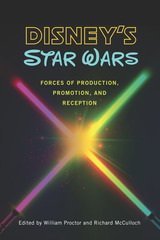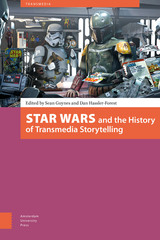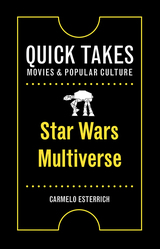3 books about Star Wars films

Disney's Star Wars
Forces of Production, Promotion, and Reception
William Proctor and Richard McCulloch
University of Iowa Press, 2019
In 2012, Disney purchased Lucasfilm, which meant it also inherited the beloved Star Wars franchise. This corporate marriage sent media critics and fans into a frenzy of speculation about what would happen next with the hugely popular series. Disney’s Star Wars gathers twenty-one noted fan and media studies scholars from around the world to examine Disney’s revival of the franchise.
Covering the period from Disney’s purchase through the release of The Force Awakens, the book reveals how fans anticipated, interpreted, and responded to the steady stream of production stories, gossip, marketing materials, merchandise, and other sources in the build-up to the movie’s release. From fears that Princess Leia would be turned into a “Disney princess” to collaborative brand management, the authors explore the shifting relationship between fans, texts, and media industries in the context of a crucial rebranding campaign. The result is a fascinating examination of a critical moment in the iconic series’ history.
Covering the period from Disney’s purchase through the release of The Force Awakens, the book reveals how fans anticipated, interpreted, and responded to the steady stream of production stories, gossip, marketing materials, merchandise, and other sources in the build-up to the movie’s release. From fears that Princess Leia would be turned into a “Disney princess” to collaborative brand management, the authors explore the shifting relationship between fans, texts, and media industries in the context of a crucial rebranding campaign. The result is a fascinating examination of a critical moment in the iconic series’ history.
[more]

Star Wars and the History of Transmedia Storytelling
Edited by Sean Guynes and Dan Hassler-Forest
Amsterdam University Press, 2018
Star Wars has reached more than three generations of casual and hardcore fans alike, and as a result many of the producers of franchised Star Wars texts (films, television, comics, novels, games, and more) over the past four decades have been fans-turned-creators. Yet despite its dominant cultural and industrial positions, Star Wars has rarely been the topic of sustained critical work. Star Wars and the History of Transmedia Storytelling offers a corrective to this oversight by curating essays from a wide range of interdisciplinary scholars in order to bring Star Wars and its transmedia narratives more fully into the fold of media and cultural studies. The collection places Star Wars at the center of those studies’ projects by examining video games, novels and novelizations, comics, advertising practices, television shows, franchising models, aesthetic and economic decisions, fandom and cultural responses, and other aspects of Star Wars and its world-building in their multiple contexts of production, distribution, and reception. In emphasizing that Star Wars is both a media franchise and a transmedia storyworld, Star Wars and the History of Transmedia Storytelling demonstrates the ways in which transmedia storytelling and the industrial logic of media franchising have developed in concert over the past four decades, as multinational corporations have become the central means for subsidizing, profiting from, and selling modes of immersive storyworlds to global audiences. By taking this dual approach, the book focuses on the interconnected nature of corporate production, fan consumption, and transmedia world-building. As such, this collection grapples with the historical, cultural, aesthetic, and political-economic implications of the relationship between media franchising and transmedia storytelling as they are seen at work in the world’s most profitable transmedia franchise.
[more]

Star Wars Multiverse
Carmelo Esterrich
Rutgers University Press, 2021
Star Wars may have started out as a film about a Manichean battle between good and evil, but as countless filmmakers, novelists, animators, fan artists and even cosplayers have taken the opportunity to play in the fictional world George Lucas created, it has expanded into something far greater, resulting in a richly layered and diverse Star Wars multiverse.
Drawing from a full range of Star Wars media, including comics, children’s books, fan films, and television shows like Clone Wars and The Mandalorian, Carmelo Esterrich explores how these stories set in a galaxy far far away reflect issues that hit closer to home. He examines what they have to say about political oppression, authoritarianism, colonialism, discrimination, xenophobia, and perpetual war. Yet he also investigates subtler ways in which the personal is political within the multiverse, including its articulations of gender and sexuality, its cultural hierarchies of language use, and its complex relationships between humans, droids and myriad species. This book demonstrates that the Star Wars multiverse is not just a stage for thrilling interstellar battles, but also an exciting space for interpretation and discovery.
Drawing from a full range of Star Wars media, including comics, children’s books, fan films, and television shows like Clone Wars and The Mandalorian, Carmelo Esterrich explores how these stories set in a galaxy far far away reflect issues that hit closer to home. He examines what they have to say about political oppression, authoritarianism, colonialism, discrimination, xenophobia, and perpetual war. Yet he also investigates subtler ways in which the personal is political within the multiverse, including its articulations of gender and sexuality, its cultural hierarchies of language use, and its complex relationships between humans, droids and myriad species. This book demonstrates that the Star Wars multiverse is not just a stage for thrilling interstellar battles, but also an exciting space for interpretation and discovery.
[more]
READERS
Browse our collection.
PUBLISHERS
See BiblioVault's publisher services.
STUDENT SERVICES
Files for college accessibility offices.
UChicago Accessibility Resources
home | accessibility | search | about | contact us
BiblioVault ® 2001 - 2024
The University of Chicago Press









